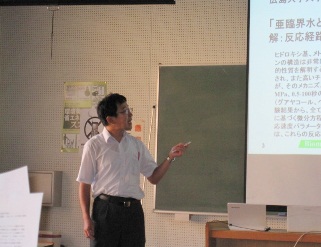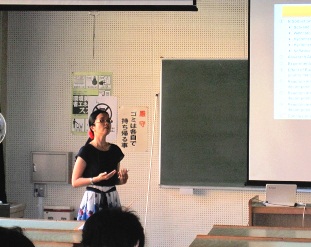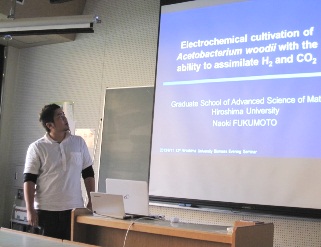|
On Sep 11, 2013, the 12th Biomass Evening Seminar was held at Graduate School of Engineering, Hiroshima University.
Yukihiko MATSUMURA
|
|
"STUDY ON THE LIGNIN DECOMPOSITION IN SUBCRITICAL AND SUPERCRITICAL WATER: DETAILED REACTION PATHWAYS, MECHANISM, AND KINETICS" Tau Len Kelly Yong
Although it is established that lignin rapidly depolymerized and higher char yield obtained in supercritical water, the mechanism are not established conclusively. Hence, the conversion of lignin and its model compounds (guaiacol, benzene, and phenol) was studied at 300–450 degree Centigrade, 25 MPa at residence times of 0.5–100 s. From the results obtained, we constructed detailed reaction pathways that encompassed all the reactions. These reaction pathways are subsequently used to obtain the kinetic parameters fitted to the resulting differential equation based on first order reaction. The kinetic parameters elucidated shows good agreement with one another. Hence the reaction rates of these reaction pathways are successfully described in this study. |
|
“Electrochemical cultivation of Acetobacterium woodii with the ability to assimilate H2 and CO2”Naoki FUKUMOTO
In our laboratory, therefore, we have investigated a useful material production technology from H2 as energy source and CO2 as a sole carbon source by homo acetogen Acetobacterium woodii. However, renewable energies such as solar and wind power are usually converted to not H2 but electricity now. In this context, if electricity can be used as energy source for useful material production directly or as H2 via electrolysis of the medium, we can dramatically expand renewable resources for useful material production by means of fermentation technology. In this study, therefore, we aimed to establish the electrochemical cultivation of Acetobacterium woodii. |
|
Machi KANNA |
[Inquiries about this article]
Thermal Energy Laboratory, Graduate School of Engineering
Y.NAKASHIMA
Mail: y4naka [AT] hiroshima-u.ac.jp
(Please replace [AT] with @)

 Home
Home
 Understanding the lignin chemistry under hydrothermal conditions is a challenge since its structure is extremely complex due to its long polymer chains with abundance aromatic rings in addition to hydroxyl and methoxyl substituent.
Understanding the lignin chemistry under hydrothermal conditions is a challenge since its structure is extremely complex due to its long polymer chains with abundance aromatic rings in addition to hydroxyl and methoxyl substituent. The reduction of CO2 emissions has been required because of the fears of global warming.
The reduction of CO2 emissions has been required because of the fears of global warming.